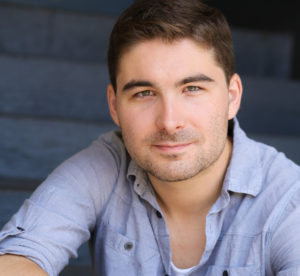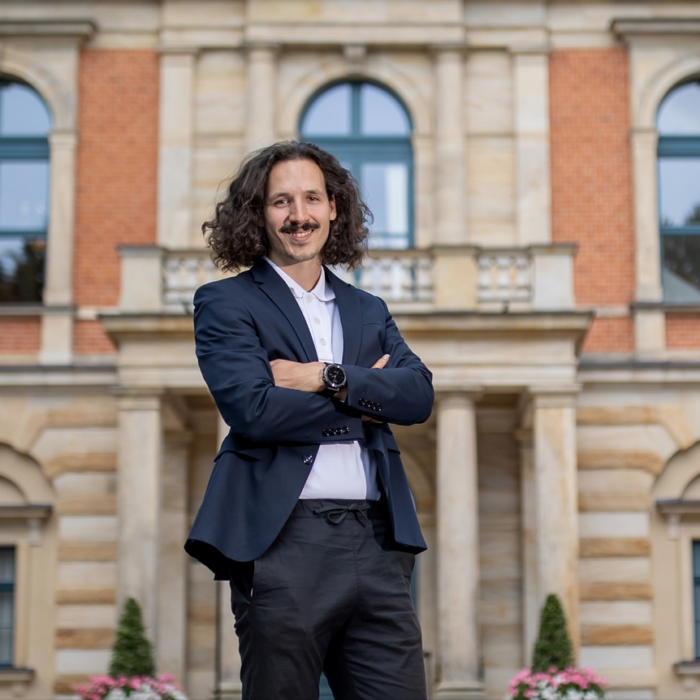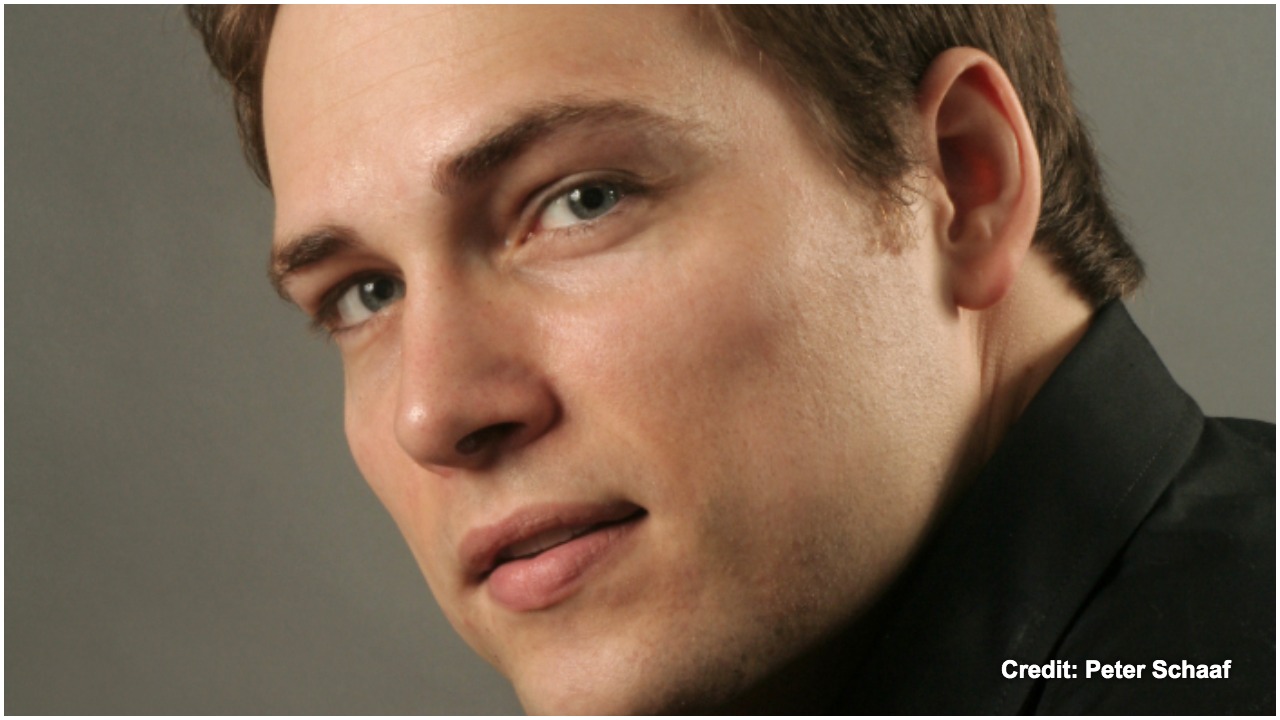
Q & A: Director James Kicklighter on His Film “The Sound of Identity”
By Chris RuelHistory was made on May 3, 2019. The first transgender baritone, Lucia Lucas, sang the title role in Mozart/Da Ponte’s, “Don Giovanni.” Such an important milestone in both opera and transgender history didn’t take place in New York or Los Angeles or Chicago; it was in Tulsa, Oklahoma that Lucas made her debut as Don Giovanni, a crucial and extremely high-profile role in the baritone repertoire. As the Tulsa Opera and Lucas prepared for the show, director James Kicklighter and crew shot a documentary, chronicling the event in “The Sound of Identity,” set to debut at the Outshine Film Festival on August 24 at 7:00 p.m. The film will stream through August 28.
Kicklighter was 18 when he began his career as a filmmaker. To date, he has credits as a producer and director for nine films, four of which are documentaries. His subjects range from cancer to political polarization in the U.S. to the fate of the Atlanta Journal-Constitution, one of the United State’s most respected newspapers. Kicklighter can now add the story of opera’s first transgender baritone to his filmography.
Raised in a small Georgia village with a population of 123, there were few chances to attend live opera theater, so Kicklighter knew little about the art before arriving in Tulsa to begin shooting the film. Jumping headfirst into the world of opera was daunting, he said, but he was reassured by many that knowledge of the art form grows from experience, as well as by being around opera people. The director was a quick study, as there is little hint in the film that he had no exposure working within the opera world until he was chosen to direct “The Sound of Identity.” His newfound understanding was also on display during our conversation. It was clear that Kicklighter “got” opera, but the story isn’t about opera per se; it’s first and foremost about the extraordinary person named Lucia Lucas.
Lucas, a native of Sacramento, California, studied horn and voice at California State University Sacramento and did her graduate work at Chicago College of Performing Arts. Her turn as Don Giovanni in Tulsa was the first time she returned to the States from Europe in 10 years. Lucas’ choice to retain her rich, captivating baritone voice after deciding to transition in 2013, stirs a sense of aural-visual dissonance the first time you hear her sing. The mind tries to make a connection between seeing a woman while hearing what is considered a male voice. I was challenged by this cognitive dissonance as I watched the film, but as Kicklighter brought me into Lucas’ world, the disconnect receded.
As Kicklighter pointed out in our conversation, vocal tone, for better or for worse, is a defining aspect of gender. He talked about the disconnect I experienced, relating it to something many people have encountered: ordering food at a drive-through restaurant. Has the person taking your order ever called you miss, or sir, and gotten it completely wrong because they made an assumption based on the pitch of your voice? Or has the opposite happened where it was you who assumed the disembodied voice was female, only to drive up to the window and be surprised? Our minds interpret gender based on a number of inputs, with vocal pitch being a major signifier. If you watch the film, you won’t be alone in trying to reconcile what you see versus what you hear.
Tulsa Opera’s artistic director, the well-known and respected composer, Tobias Picker, took a massive risk in casting Lucas as Don Giovanni. How would Tulsa operagoers react? Kicklighter worried there might be picket lines or demonstrations, but none of that happened. Lucas was welcomed by the company’s supporters and had a solid run as opera’s most famous rake. In addition to having tackled Don Giovanni, Lucas has sung or is slated to sing other leading baritone roles, such as Wotan in “Die Walküre,” Monterone in “Rigoletto,” Sharpless in “Madama Butterfly,” and Escamillo in “Carmen.” Put bluntly, Lucas’ career is rising based on her vocal prowess, not her novelty as the first transgender baritone, and that’s exactly how she wants it to be. As she states in the film, her goal is to be a great singer, representing opera to the best of her ability through her art, not her gender. By all accounts, she is succeeding as the acclamations continue to roll her way.
OperaWire: What started this project: how and when did you learn about Lucia Lucas?
James Kicklighter: I was in Tulsa in 2017, and during that trip, I bumped into Russ Kirkpatrick and Andy Kinslow, who are the film’s producers. We saw each other for maybe 15 or 20 minutes and talked about film stuff. Fast forward two years later, after they had gotten the rights to do this film, they gave me a call and told me about Lucia Lucas — that she’s an opera singer, she’s transgender, and she’s going to make history in Tulsa. They asked what would you do with that? That started sparking some ideas and eventually, they settled on me to direct the film.
OW: The character of Don Giovanni is the epitome of toxic male behavior. So, here you have a transgender female taking on the role of a serial abuser. It’s quite fascinating.
JK: Staging Don Giovanni in this cultural moment with Lucia in the role was a really interesting choice creatively because you’re telling the story of a sexual abuser in the time of Harvey Weinstein and the #MeToo reckoning. And you’re doing that with the transgender singer in Tulsa, Oklahoma. That has a lot of rhetorical load. I think the fact that they made the choice speaks volumes to the integrity of both Tobias Picker and the Tulsa Opera.
OW: Let’s talk about Tulsa. Having come from an extremely small town in Georgia, did you have concerns that a transgender woman singing Don Giovanni might not go over well in Oklahoma?
JK: That is something that I think is really interesting, especially in the context of the past couple of months. President Trump had his first rally there to kick off the campaign. The same Tulsa, that can have the rally is also the same Tulsa where they had the first transgender opera singer in American history — in world history — to take a leading role on a mainline stage. I think that sometimes we do a disservice to places when we generalize what they are. When we say they’re only one thing, they can be many things. I think that it shows that people and places are really complex.
I’m sure there were people out there that didn’t approve or didn’t come to the opera, but those weren’t the people that were going to come anyway. There are people in this world that are hateful and bigoted, and there are a lot of good people out there, too. They live in Tulsa just as much as they live in New York or Los Angeles.
OW: What were some of the more challenging aspects of filming a documentary about an opera singer?
JK: The first thing I needed to do was to make sure that Lucia felt comfortable with me and that she felt comfortable with me telling her story.
The other piece was making sure that I wasn’t getting in the way of her or the opera company as they worked to deliver their performance. That’s the tricky thing about doing this sort of film. On one hand, you need to have total access to tell a complete story, while on the other, they’re preparing for a live performance. You can’t get in the way of that. We set a very specific schedule: we’re going to do interviews on these days, we’re going to shoot B roll on these days and everyone was on the same page. I tried to strip our crew down to the smallest group we could to make sure that we were kind of flies on the wall while we let them get their work done.
OW: I want to circle back to Lucia’s comfort level. How did you gain her trust?
JK: Anytime you’re doing any type of film, it doesn’t matter if it’s a documentary or scripted film, whatever it is, the first thing that the talent has to know from you as a director is that you’re not going to destroy their life. And I say that not in jest because they’re placing their talent, whatever it may be, in your hands.
And so, to build that trust, I did a bunch of preliminary conversations with Lucia before we even started filming. We talked about her background and about her life. I communicated to her — I believe during our first conversation — that I wasn’t going to address her transition at all in the film. That was a creative choice I made walking into the film; that was a pitch I made to the producers and I was supported in that. I think the decision made her feel comfortable because my rationale was this: Most films I’ve seen about a trans person focus on the transition. I’ve never seen a fully dimensional character because everything is set through that lens, so I wanted to try to figure out a way to move past that conversation. Not covering Lucia’s transition was something that appealed to her.
OW: Was Lucia ever hesitant, and how involved was she or could she be given rehearsal schedules?
JK: There were moments of hesitation throughout the process, but the longer you’re filming with someone, if you’re doing your job right, the more comfortable they become. Once we got past the first week or so of filming, everybody kind of forgot the camera was there because we faded into the background.
Lucia was very open to letting me do what I wanted, something for which I give her a lot of credit. I don’t know if I would have that same trust. That was a big thing, especially because of some of the themes and ideas that I wanted to explore. Some of which were risky decisions in hindsight.
OW: Opera has always been a gender-bending art form with trouser roles — women taking on male roles — and, earlier in opera history, castrati taking on female roles. Lucia’s story takes the art form’s gender fluidity one step further.
JK: That was something that I was obviously fascinated with because although gender fluidity is common in opera as Michael Cooper so eloquently states in the film, there also is the element of the personal, it’s not just a performance, it’s also your life. And so, in some ways, I think it’s an interesting way of life imitating art when it comes to Lucia’s performance in “Don Giovanni.”
OW: Sticking with the theme of identity, in opera and in life, what can you tell me about the film’s title?
JK: This was a film that was a really hard one to name because there were a couple of big ideas that I tried to explore in this film. It all came down to a negotiation between self and identity. And for me, “The Sound of Identity” taps into the idea of voice and gender, it taps into the idea of how we present ourselves in the world and what that looks like.
Lucia’s entire career is based on what she can do with her voice. And it’s also true that we assign gender identity to tenors of tone — low pitches, high pitches — it’s an immediate thing that people respond to. I could see people react to her baritone voice in different ways while we were filming. Some people felt really uncomfortable with it while for others it didn’t matter. That was fascinating for me to observe.
The film opens with Lucia singing before she speaks. It was a very intentional choice to do that. You hear a voice coming from somewhere and then a few seconds later, it cuts to Lucia. As an audience member, you have this moment where you’re negotiating your conceptions of what gender is versus the voice that’s coming out from her mouth. That’s something that I really want audiences to consider when they’re watching this film. A lot of people associate gender with pitch. Right or wrong, it’s something we do.
OW: There were times during the film in which you didn’t use, what I’ll call, the standard documentary style. I felt as though I were watching two actors in a feature film. Talk to me about the artistic decision behind that?
JK: So, I’m really thrilled to hear that you felt that way; I wanted it to feel that way. My director of photography, Jonathan Pope, and I go way back, we were roommates in college. I wanted to be a director, and he wanted to be a director of photography. We’ve both been lucky to see that through in our personal lives.
Jonathan and I thought about this film in narrative terms and wanted to treat this like it is a scripted film. So, with every shot, every setup, and even every interview for that matter, we wanted to convey something about the character that felt heightened like the world of opera. We believed the film needed to have an operatic style. If we approached it like a documentary that was kind of gritty or not as well-framed or composed, it would’ve done a disservice to the world we were trying to bring the viewer into.
OW: Having now done a documentary on an opera singer, what’s your biggest takeaway? What did you learn about the art form?
JK: I had no idea how big it was. I think one of the sad tragedies of modern opera is that it keeps dying, right? A lot of these institutions are struggling financially, or they can’t tell stories because they don’t have enough money. Perhaps there is an audience dying away and there’s not a younger generation coming in to replace it. I think for me, my takeaway was that opera has a lot to offer modern audiences, but modern audiences have no idea what opera offers because they haven’t been exposed to it.
People like Lucia give opera a more modern face, and if they’re able to flourish, if they’re able to succeed, I think they might be able to bring in new audiences. If opera is to survive as an art form, if it deserves to survive as an art form, it’s going to have to move a little bit quicker than it does. That was my takeaway.
OW: And what would you like audiences to take away from the film?
JK: I hope audiences take away a story of power, about claiming their own narrative. I think that’s the most important thing. If we don’t claim our own destiny and our own life, we’re not ever going to be happy people.
As artists, I think that if we are able to tell our stories confidently and if we are able to communicate what it is we want to be as artists, then I think audiences can see us for who we are and, in some ways, be able to understand something about themselves and their own lives. I hope that’s what they take away.



